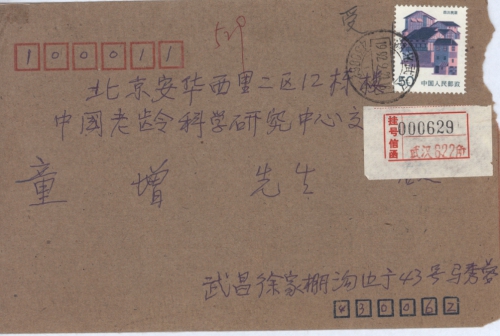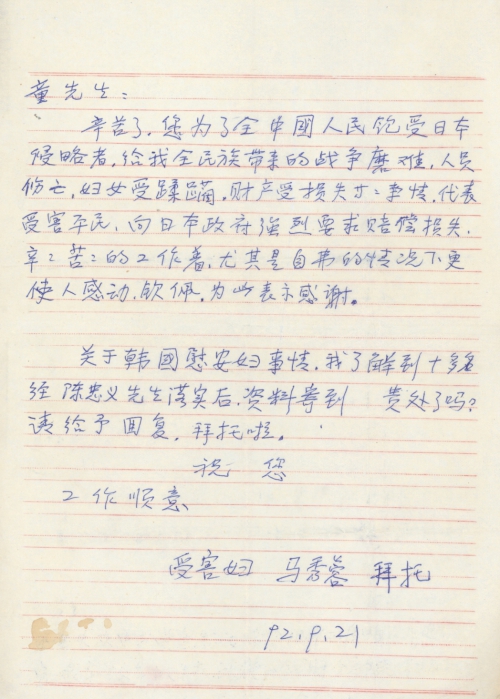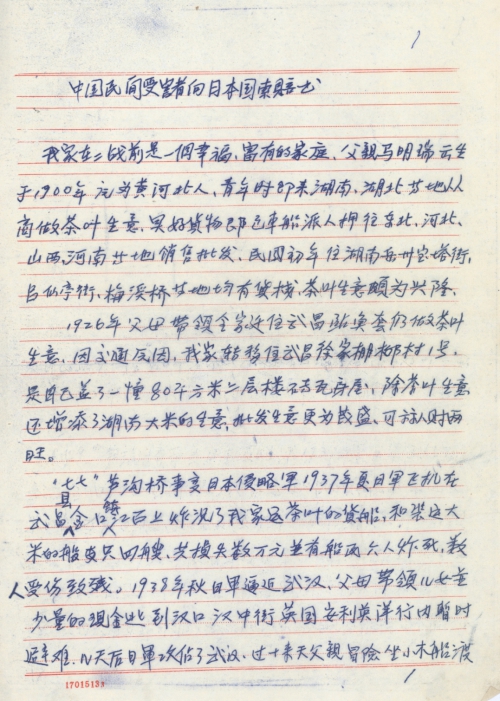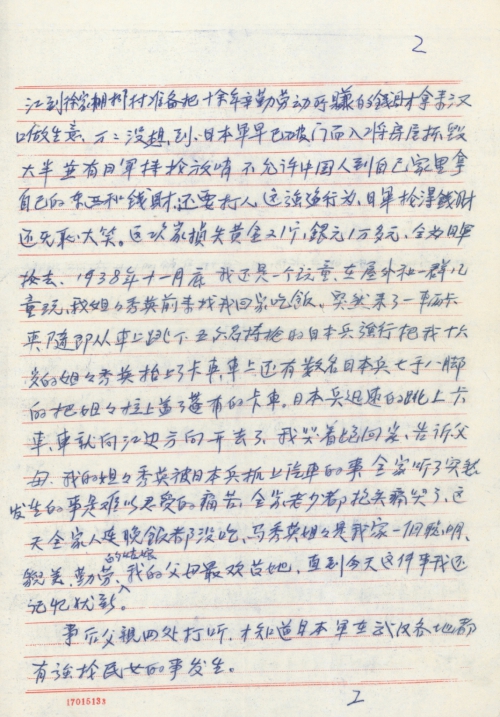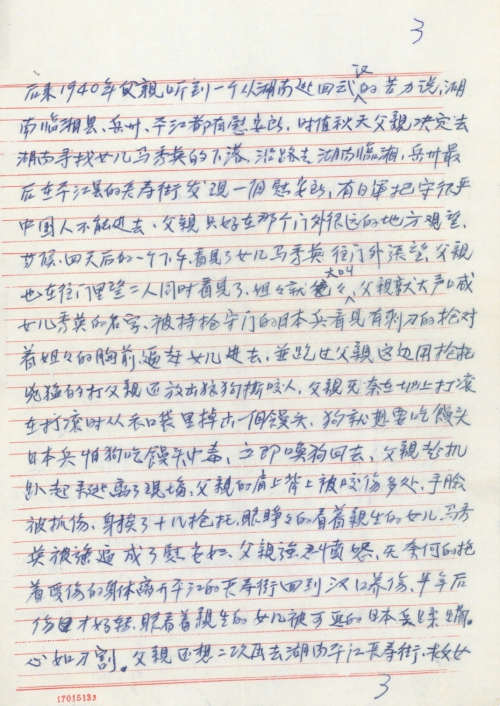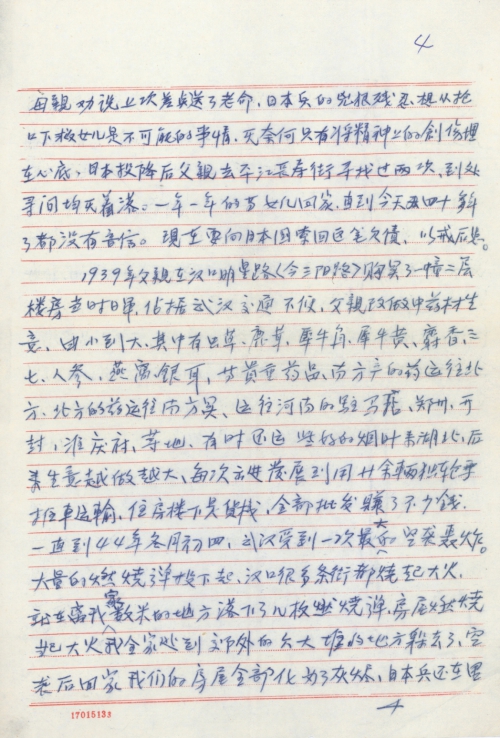Date of letter:1992-09-21
Address of author:Wuchang County, Wuhan City, Hubei Province
Date of event:1937-1938
Location of event:Wuchang County, Wuhan City, Hubei Province
Name of author:Ma Xiurong
Name(s) of victim(s):Ma Xiurong‘s family
Type of atrocity:Air Bombings, Others, Sex Slaves(AB, OT, SS)
Other details:Before the Japanese invasion of China, I had a happy family and my father was engaged in tea business. In 1937, the Japanese army bombed Wuchang County. Our cargo ships carrying tea and rice were destroyed and 6 people were killed. One day in 1938, the Japanese soldiers broke into our house and destroyed most of the house. My sister was caught by the Japanese soldiers and forced to be a comfort woman. During the period, my father secretly went to see her, but was bit by the Japanese soldiers’ dogs. The Japanese soldiers also hit my father with buttstock. My family broke up due to the Japanese invasion of my hometown. The Japanese government must compensate.
Mr. Tong,
You have done a great job. To address the war sufferings brought by the Japanese invaders against the whole nation of Chinese people, including death of people, raping of women, and loss of properties etc, on behalf of the civilian victims, you strongly demanded damage compensation toward the Japanese government, and worked conscientiously, especially considering the fact that you are working at your own expense, it is indeed a moving and admirable feat, for which I wish to express my deep appreciation.
About the South Korean comfort woman matter, I learned Mr. Chen Zhongyi had verified info of more than ten persons, has the material been mailed to you? I look forward to receiving your reply, thanks.
Wish you
All the best
Entrusted by victim: Ma XX
92.9.21
Claim Letter from Chinese Civilian Victims against Japan
Before the WWII my family was a happy and well-off family. My father Ma XX was born in 1900, with original native place in the north of the Yellow River, during his youth days he came to Hunan and Hubei areas to do tea business, after goods purchase he would immediately charter vehicle or ship to dispatch the goods to Northeast China, Hebei, Shanxi and Henan for sales and wholesale. In the early years of the Republic of China, he had warehouses on Baota Street, Lüxianting Street, and Meixi Bridge in Yuezhou, Hunan, his tea business was booming.
In 1926, my parents led the whole family to relocate to Nianyutao in Wuchang, still engaged in tea business. Owing to transport reasons, my family moved to Wuchang, which was a self-built 80 sqm 2-level brick and tile house. Apart from tea business, we also sold Hunan rice, the wholesale business became more prosperous, with good result in both family happiness and income.
After the “July 7” Marco Polo Bridge Incident, in the summer of 1937, the Japanese Invasion Army’s aircrafts bombed and sunk my family’s cargo ship loaded with tea and 4 ships loaded with rice on the river surface near Jinkou Town, Wuchang County, the loss amounted to several dozen thousand yuan, six sailors were killed, several others were wounded and handicapped. In the autumn of 1938 the Japanese Army approached Wuhan, my parents led children and took a little cash to flee to British Arnhold H.E Company on Hanhong Street in Hankou for temporary shelter. Several days later, the Japanese Army seized Wuhan, after about ten days my father took the risk to ride a wooden boat and crossed the river to reach Liu Village in Xujiapeng, planning to take the money he accumulated through hard work over the past ten plus years back to Hankou to do business. Little did he expect that the Japanese soldiers had already smashed the door and made entry, the house was almost destroyed, and was then guarded by gun-toting Japanese soldiers, no Chinese were allowed to enter his own home to take articles and money. After the robbery, the Japanese soldiers even laughed shamelessly and threatened to beat my father. This time my family lost 21 catties of gold, over 10000 silver dollars, all of which were looted by the Japanese Army. One day at the end of November, 1938, I was playing outside with a group of children, my elder sister XX came to take me home to have dinner, suddenly a truck appeared from nowhere, five to six gun-toting Japanese soldiers jumped down from the truck, and carried my 16 year old elder sister XXonto the truck, several other Japanese soldiers grabbed my elder sister and pulled her into the truck covered with tarpaulin. The Japanese soldiers quickly jumped onto the truck, which ran toward river side direction. I ran home crying, and told my parents that my elder sister XXwas captured by Japanese soldiers and forced onto a truck, the sudden incident was like a bolt from the sky, the whole family was plunged into intolerable anguish, everyone hugged one another and cried bitterly, on this day the whole family felt distraught and skipped the dinner. My elder sister XX was an intelligent, pretty, and diligent girl, my parents liked her best among all the children, until today what happed on that day was still fresh in my mind.
After that my father asked around everywhere, it was then that he knew that the Japanese Army took away civilian women everywhere in Wuhan.
Later, in 1940 my father learned from a coolie who escaped from Hunan to Wuhan that there were comfort stations in Linxiang County, Yuezhou, and Pingjiang in Hunan, in the autumn my father decided to go to Hunan to look for the whereabouts of his daughter Ma XX. Along the way we passed Linxiang, and Yuezhou in Hunan, and finally found a comfort station on Changshou Street in Pingjiang County. But it was guarded by Japanese soldiers; no Chinese was allowed to enter. My father had to stay away from the gate at a long distance and watched, in one afternoon four days later, he saw Ma XX looking out of the gate. At that moment my father was also watching the gate, both saw each other, my elder sister shouted, my father cried out his daughter’s name, the Japanese guard saw what happened, and used bayonet to force my elder sister back into the gate, after that he ran toward my father and beat him with gun stock, meanwhile he unleashed a hound to attack my father. My father had to roll on the ground to avoid the hound, when he was rolling around a steamed bun jumped out from his pocket, the hound wanted to eat it, but the Japanese soldier feared it was a poisoned steamed bun, so he immediately called back the hound, my father took advantage of this chance and left. My father was bitten on the shoulder and on the back at several places, with scratches on both hands and face, plus a dozen gun stock beating, on top of that he personally saw his daughter Ma XXwas forced to become a comfort woman. Despite anger, my father helplessly left Changshou Street in Pingjiang, and retuned to Hankou to treat the wound. It was not until half year later that the wound healed. Seeing his daughter suffering in the hands of the loathsome Japanese, my father felt as if a knife was carving his heart. My father wanted to go to Changshou Street in Pingjiang, Hunan again to save his daughter. My mother persuaded him that last time it nearly cost his life, the Japanese soldiers were ferocious and barbarian, taking back his daughter from under the muzzle of guns was almost impossible. Feeling resigned, my father only had to bury the mental trauma in the depth of the heart. After Japan surrendered, my father went to Changshou Street in Pingjiang twice, he searched everywhere but found nothing. Year after year he waited for the return of his daughter, till today more than forty years have passed, there was no news. Now we want to settle this debt with Japan, lest we should worry.
In 1939, my father bought a two-storied house on Mingxing Road (Sanyang Road today) in Hankou. At that time the Japanese Army occupied Wuhan, transport was inconvenient, my father changed to do Chinese medicinal materials business. The goods ranged from small to big, including precious drug materials like worm grass, pilous antler, rhinoceros horn, bezoar, deer scent, Panax Notoginseng, ginseng, swallow nest, and white fungus. He shipped drugs from the South to the North, and drugs from the North to the South. The goods were shipped to Zhumadian, Zhengzhou, Kaifeng, and Huaiqingfu in Henan, sometimes good tobacco was shipped back to Hubei. Later the business grew considerably, each time of goods transport involved over 20 wheel barrows. The downstairs of the house was warehouse, all the wholesale business made much money. It was in November 4 in 1944 on the lunar calendar, Wuhan received the biggest air bombing in its history. Massive numbers of incendiary bombs were dropped; many streets in Hankou were engulfed in big fire. A few incendiary bombs landed only several meters away from my family’s , houses which caught fire and erupted into flame, then my whole family fled to Liudadui in the suburbs to hide away. We returned home after the bombing, only to find that our house was razed to the ground. The Japanese solders














